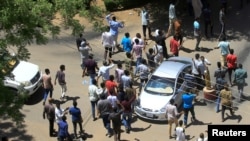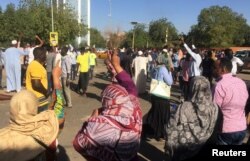Thousands of Sudanese protesters clashed with security forces outside President Omar al-Bashir's residence in central Khartoum on Saturday in what appeared to be the biggest demonstration in months of protest
against his 30-year rule, witnesses said.
Across the River Nile in Khartoum's twin city of Omdurman, which also saw protests into the evening, one civilian died from injuries suffered during "rioting," and other civilians and police officers were wounded, state news agency SUNA said, citing police reports.
The victim was a laboratory doctor, according to a statement from an opposition doctors committee. Medical staff have played a prominent role in the protests, in which dozens of people have been killed over the past 3½ months.
Security forces fired tear gas at protesters in Omdurman and at stone-throwing demonstrators near Bashir's residence, who had responded to a call by activists trying to increase pressure on Bashir to step down.
They waved Sudanese flags and chanted slogans demanding "freedom, peace and justice" as they gathered outside the gates of the compound, guarded by army soldiers, that also houses the defense ministry, army command and security headquarters.
By the evening, the clashes subsided as security forces pulled back, allowing the thousands still gathered to remain outside the compound. Witnesses said young demonstrators sang nationalist songs and danced for joy. Some said they would stay until Bashir stepped down.
Praise for security forces
Information Minister Hassan Ismail, who also serves as the government spokesman, praised security forces for the manner in which they handled the protests and said the government remained committed to dialogue to resolve the crisis.
"The approach followed by government apparatus was met with satisfaction from citizens," Ismail said in a statement. "Sudanese blood is the most precious thing we need to preserve."
Bashir has refused to step down, saying his opponents need to seek power through the ballot box.
"Today, we won and we are confident that the regime will fall," said Mohamed Saleh, a 63-year-old university professor who estimated the crowd to be at more than 100,000 people.
An independent estimate for the number of protesters was not available. But witnesses said the protest appeared to be larger than previous ones.
"There are crowds as far as the eye can see," one witness told Reuters.
Anniversary
Sudanese activists, apparently emboldened by the success of similar but much larger protests in Algeria that forced ailing President Abdelaziz Bouteflika to step down, called Saturday's protests to mark the anniversary of the 1985 coup that forced then-President Jaafar Nimeiri to step down following mass protests against his rule.
The demonstrators said they wanted to deliver a message to the country's armed forces to side with them in trying to push Bashir out of power.
Sudanese say the armed forces had in the past backed popular protests against autocratic rulers, including the 1985 move against Nimeiri.
Nimeiri's downfall paved the way for national elections and a civilian government, which Bashir ousted in an Islamist-backed military coup in 1989. Bashir had since run and was elected president in repeated elections that his critics say were neither fair nor free.
Price increases, cash shortages
Representing the most sustained challenge to Bashir since he took power in 1989, the wave of protests that began on Dec. 19 were triggered by price rises and cash shortages but have evolved into demonstrations against his long rule.
In February, Bashir declared a state of emergency in the country of 40 million and sacked his government and state governors in a series of moves aimed at tightening his control.
Bashir is wanted by international prosecutors for alleged war crimes while trying to put down an armed uprising in the country's western Darfur region since 2003. Sudan denies committing any war crimes.







